Kite flying is very popular in Hyderabad during Sankranthi. People get onto their rooftops and enjoy kite flying and kite fighting. Do you want to experience this kite flying thrill and excitement but don’t know where to start and how to purchase kites and other related accessories? You are reading the right article. Here, we tried to help people like you in buying good kites and other related accessories – the first step in kite flying!
Before going to fly a kite, you need to have some basic things like a kite, thread, a spindle (charak) and some manja (not mandatory).
Types of kites – Basically, kites are of two types. One, bordered with a thread and the other without. The thread-bordered kites are called Doredaars. Go for a Doredaar kite as it is designed to protect the paper from tearing. Go to the shopkeeper ask for Doredaar kites.
Sizes of Kites – Kites are available in different sizes. These include – number 5, number 6, half-pound (aada-pound), one-pound (ek-pound), and two-pounds (do-pound). Number 5 to do-pound, we have listed (in the image below) them in ascending order of the size – No.5 is the smallest and do-pound is the biggest. There are kites smaller than number 5 too. But, generally they will not be Doredaars.
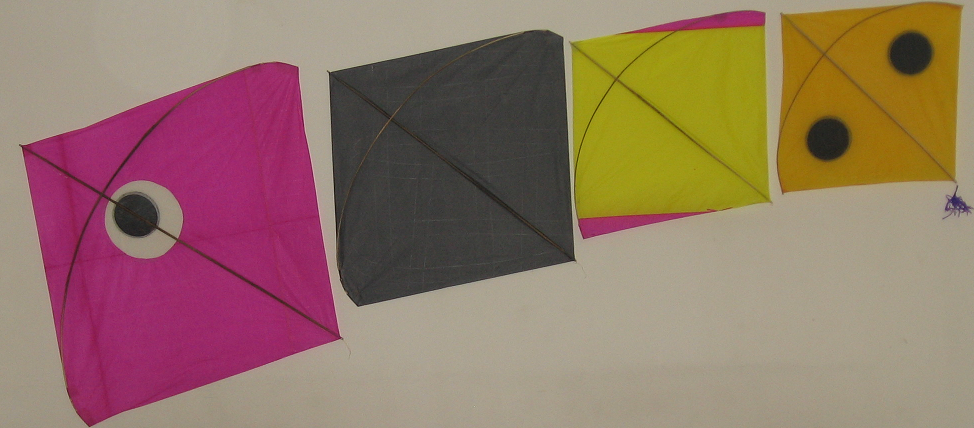
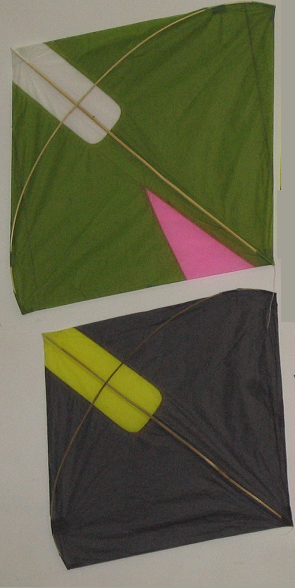 People assume that small kites are easy to fly. But in fact, the smaller the kite is, the more difficult it is to handle and control it, especially for beginners. It’s better to go for a half pound kite. They are big and are easy to fly and control. Half pound kites cost you anywhere between Rs 9 to 12 – depending on where you buy. Ask for ‘Aada-pound’ kites.
People assume that small kites are easy to fly. But in fact, the smaller the kite is, the more difficult it is to handle and control it, especially for beginners. It’s better to go for a half pound kite. They are big and are easy to fly and control. Half pound kites cost you anywhere between Rs 9 to 12 – depending on where you buy. Ask for ‘Aada-pound’ kites.
Colours of kites – Kites are available in different colours, patterns and designs. You can choose the one of your choice. However, darker colours are better as they make the kite visible even at greater heights. It is also a good idea to choose design kites. The design (particularly, Zebia or Longot – see images on right) on the kite helps you know the top and bottom of the kite while it is flying.
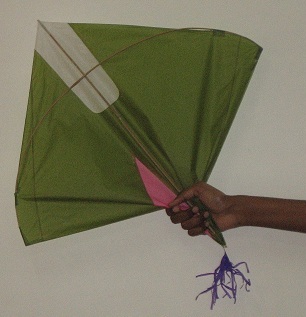 Kite materials – Kites come in different varieties of materials such as paper, plastic, etc. It’s better to choose paper kites as they fly well.
Kite materials – Kites come in different varieties of materials such as paper, plastic, etc. It’s better to choose paper kites as they fly well.
In paper kites, we will find two qualities. Take the ones which look thin and loosely tied to the sticks. The paper looks like wax paper and is called as German paper. If you fold the kite at the bottom, the paper should not tear (See image on right). Thick quality ones, though look as if they are of good quality, tear easily as they are tightly tied and are not flexible. Check for German paper kites and purchase them.
Sticks of the Kites – Kites will have two sticks – one horizontal and the other vertical. The vertical one will be straight and the horizontal one will be slightly curved and bent at the ends.
Make sure that both the sticks are thin and straight (without any joints). Thin sticks are called as ‘Halka Badha’. These kites will be light in weight and are easy to fly.
If the sticks are thick, the kite becomes heavy and flying becomes difficult. So, ask the shopkeeper for a ‘Halka patang’ (light-weighted kite) if you find it difficult to choose.
Thread – Two kinds of threads are used to fly a kite. One will be thick and somewhat sharp, which is called manja. Manja is used to cut other kites. Choose a thick and strong manja that is hard to cut. Manja is usually measured in geeti. One geeti of manja is enough for one kite and the rest will be a plain thread (Saadi).
Two geeties of manja is enough for the beginners (if you lose one, you can use the other). Don’t buy a full Charak (spindle) of manja. You can’t even store it for the next year as it wears and becomes useless. You will waste it, instead you purchase more kites – while flying you may damage some.
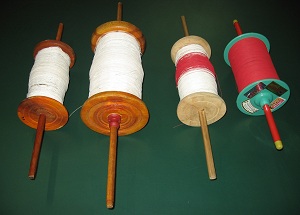
The other thread that should be tied after one geeti of Manja is the plain thread, which is called Saadi. A saadi of 200 meters long is more than enough for a beginner. Don’t ask for ‘plain white thread’, ask for ‘Saadi’.
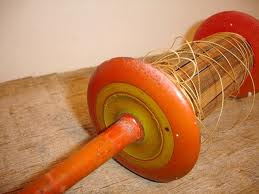
Charak – The spindle on which the thread is rolled is the Charak. Charaks are available in different materials like wood, steel and plastic. It is better to go for a light-weight, smooth finished wooden Charak.
Some useful tips
- Always go for big kites. Take kites with thin sticks.
- Don’t spend more on Manja and Saadi. Spend more on the kites as you may lose them in the beginning stage. You can also spend on Charak as you can reuse it Spend only 10% of your entire budget to buy Manja.
- Don’t worry about losing the kite, it’s natural.
- Kites with tails are easy to fly and manage. Put a big paper tail to your kite, if it is not easy to control.
- Be familiar with the local names of the kite related things (kite flying jargon) like patang (kite), charak (spindle), manja (sharp thread used to cut others’ kites), saadi (plain thread), halka-patang (Light weighted kite), aada-pound, etc. so that the shopkeeper doesn’t fool you.
You may also like to read:
- Places to Buy Good Kites and Manjas in Hyderabad
- Getting Your Kite Ready to Fly – The Art of Tying the Thread to Kite Simplified
- Understand the Kite Flying Jargon Used in Hyderabad
